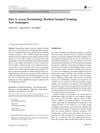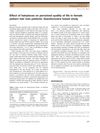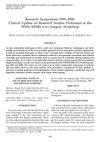3 citations,
March 2022 in “Transgender Health” More research is needed to improve lower body gender affirmation techniques.
 1 citations,
December 2022 in “Actas dermo-sifiliográficas/Actas dermo-sifiliográficas”
1 citations,
December 2022 in “Actas dermo-sifiliográficas/Actas dermo-sifiliográficas” Sensitive scalp causes discomfort and hair loss, treated with personalized care.
 1 citations,
May 2021 in “Pharmacy Practice (internet)”
1 citations,
May 2021 in “Pharmacy Practice (internet)” The review concludes that pharmacists should clearly define their product as more than medication, including their knowledge and services, to effectively communicate their value.
 417 citations,
March 1991 in “American Journal of Psychiatry”
417 citations,
March 1991 in “American Journal of Psychiatry” Most adult chronic hair pullers are women who started in their early teens, often have other mental health issues, and may pull hair due to underlying psychiatric conditions.
 22 citations,
May 2021 in “Nature Communications”
22 citations,
May 2021 in “Nature Communications” Tissue stiffness affects hair follicle regeneration, and Twist1 is a key regulator.
 11 citations,
April 2016 in “The American Journal of Dermatopathology”
11 citations,
April 2016 in “The American Journal of Dermatopathology” Special and immunohistochemical stains are not routinely needed for diagnosing hair disorders.
 1 citations,
March 2016 in “Current Dermatology Reports”
1 citations,
March 2016 in “Current Dermatology Reports” New evaluation tools are needed for better surgical training in dermatology residency programs.
 85 citations,
August 2018 in “Psychological Medicine”
85 citations,
August 2018 in “Psychological Medicine” Women with PCOS are more likely to suffer from depression, anxiety, and stress.
 2 citations,
July 2022 in “Journal of The American Academy of Dermatology”
2 citations,
July 2022 in “Journal of The American Academy of Dermatology” People with alopecia who are more resilient tend to feel less stressed.
May 2022 in “Hormones and behavior” Prairie dogs with fewer neighbors are more stressed but their number of babies isn't affected.
 74 citations,
January 1998 in “Dermatology”
74 citations,
January 1998 in “Dermatology” Men who think they are losing hair feel worse about themselves, especially if they are younger.
 32 citations,
October 1999 in “Journal of women's health and gender-based medicine”
32 citations,
October 1999 in “Journal of women's health and gender-based medicine” Hair loss greatly affects women's mental health and appearance satisfaction.
 5 citations,
December 2012 in “Journal of Dermatology”
5 citations,
December 2012 in “Journal of Dermatology” Wigs greatly improve life quality for hair loss patients.
 3 citations,
June 2013 in “Journal of Dermatology”
3 citations,
June 2013 in “Journal of Dermatology” Hairpieces improve quality of life for women with hair loss.
March 2020 in “bioRxiv (Cold Spring Harbor Laboratory)” Health issues in retired breeder guinea pigs don't affect experiment success.
 1 citations,
March 2019 in “International Journal of Cosmetic Science”
1 citations,
March 2019 in “International Journal of Cosmetic Science” The model predicts hair breakage based on key hair properties and helps product developers.
 22 citations,
January 2015 in “Dermatology Research and Practice”
22 citations,
January 2015 in “Dermatology Research and Practice” An extra-strength marine protein supplement helped increase hair growth and decrease hair shedding in women with thinning hair.
40 citations,
May 2018 in “PubMed” Nutrafol® Women's Capsules safely and effectively promote hair growth in women with thinning hair.

Toupees improved perceived attractiveness, especially by older people, but had little effect on perceived self-assurance and health.
 36 citations,
January 1998 in “Journal of Dermatological Treatment”
36 citations,
January 1998 in “Journal of Dermatological Treatment” The questionnaire effectively measures men's perceived hair growth and can distinguish between different treatments and dosages.
 10 citations,
June 2001 in “International Journal of Cosmetic Surgery and Aesthetic Dermatology”
10 citations,
June 2001 in “International Journal of Cosmetic Surgery and Aesthetic Dermatology” Splitting single-hair grafts seems to improve perceived hair fullness without affecting growth, intact grafts grow slightly better, and the Mantis microscope is clear but slower without reducing damage to grafts.
3 citations,
December 2021 in “Skin research and technology” Higher hair luminosity and shine mean higher perceived transparency.
 September 2024 in “Journal of the American Academy of Dermatology”
September 2024 in “Journal of the American Academy of Dermatology” Using gratitude journals can improve perceived hair loss and quality of life in women.
 2 citations,
September 2000 in “International Journal of Retail & Distribution Management”
2 citations,
September 2000 in “International Journal of Retail & Distribution Management” The document concludes that understanding consumer-brand relationships is key for marketing and that perceived quality helps national brands maintain higher prices than store brands.
 61 citations,
April 2012 in “British Journal of Dermatology”
61 citations,
April 2012 in “British Journal of Dermatology” Caucasian women's hair appears thickest in their 20s, with perceived thinning after mid-30s due to both decreasing density and diameter.
 26 citations,
June 2016 in “Pediatric Dermatology”
26 citations,
June 2016 in “Pediatric Dermatology” Premature hair graying in young Turkish adults is more likely if they have stress, a family history of graying, drink alcohol, have chronic diseases, are older, or are taller.
16 citations,
January 2018 in “International journal of trichology” Genetics and nutritional deficiencies are key factors in premature graying of hair.
 2 citations,
December 2021 in “Scientific reports”
2 citations,
December 2021 in “Scientific reports” Scalp hair sweating is a significant predictor of hair cortisol levels.
 2 citations,
September 2019 in “Current Issues in Pharmacy and Medical Sciences”
2 citations,
September 2019 in “Current Issues in Pharmacy and Medical Sciences” Changing habits can make you look younger and improve your overall health.
 July 2023 in “Dermatology practical & conceptual”
July 2023 in “Dermatology practical & conceptual” Women with Female Pattern Hair Loss may experience more stress, anxiety, and depression, and have lower levels of BDNF, which could predict the psychological impact.























